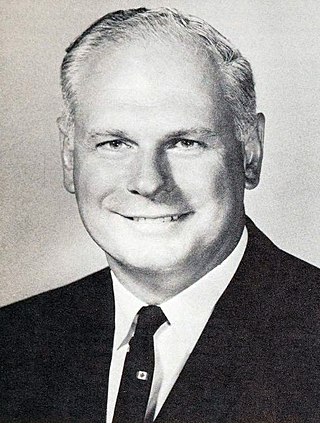
Charles Joseph Clark is a Canadian businessman, writer, and politician who served as the 16th prime minister of Canada from 1979 to 1980.

The Progressive Conservative Party of Canada was a centre to centre-right federal political party in Canada that existed from 1942 to 2003.

Edgar Peter Lougheed was a Canadian lawyer and Progressive Conservative politician who served as the tenth premier of Alberta from 1971 to 1985, presiding over a period of reform and economic growth.
The Conservative Party of Canada, colloquially known as the Tories or simply the Conservatives, is a federal political party in Canada. It was formed in 2003 by the merger of the two main right-leaning parties, the Progressive Conservative Party and the Canadian Alliance, the latter being the successor of the Western Canadian–based Reform Party. The party sits at the centre-right to the right of the Canadian political spectrum, with their federal rival, the centre-left Liberal Party of Canada, positioned to their left. The Conservatives are defined as a "big tent" party, practising "brokerage politics" and welcoming a broad variety of members, including "Red Tories" and "Blue Tories".
David Orchard is a Canadian author and political figure, member of the Liberal Party of Canada, who was the Liberal Party candidate for the Saskatchewan riding of Desnethé—Missinippi—Churchill River in the 2008 federal election.

Paul Theodore Hellyer was a Canadian engineer, politician, writer, and commentator. He was the longest serving member of the Queen's Privy Council for Canada at the time of his death.

The 1972 Canadian federal election was held on October 30, 1972, to elect members of the House of Commons of Canada of the 29th Parliament of Canada. It resulted in a slim victory for the governing Liberal Party led by Prime Minister Pierre Trudeau, which won 109 seats, compared to 107 seats for the opposition Progressive Conservatives led by Robert Stanfield. Trudeau's Liberals experienced a decline in support as a result of rising unemployment.

Robert Lorne Stanfield was a Canadian politician who served as the 17th premier of Nova Scotia from 1956 to 1967 and the leader of the Official Opposition and leader of the Progressive Conservative Party of Canada from 1967 to 1976.

The 1984 Canadian federal election was held on September 4, 1984, to elect members to the House of Commons of the 33rd Parliament of Canada.

The 1968 Canadian federal election was held on June 25, 1968, to elect members of the House of Commons of Canada of the 28th Parliament of Canada.

The 1980 Canadian federal election was held on February 18, 1980, to elect members of the House of Commons of Canada of the 32nd Parliament of Canada. It was called when the minority Progressive Conservative government led by Prime Minister Joe Clark was defeated in the Commons.

The 1979 Canadian federal election was held on May 22, 1979, to elect members of the House of Commons of Canada of the 31st Parliament of Canada. It resulted in the defeat of the Liberal Party of Canada after 16 years in power, 11 of them under Prime Minister Pierre Trudeau. Joe Clark led the Progressive Conservative Party to power but with only a minority of seats in the House of Commons. The Liberals, however, beat the Progressive Conservatives in the overall popular vote by more than 400,000 votes. Taking office on the eve of his 40th birthday, Clark became the youngest prime minister in Canadian history.

The 1974 Canadian federal election was held on July 8, 1974, to elect members of the House of Commons of Canada of the 30th Parliament of Canada. The governing Liberal Party was reelected, going from a minority to a majority government, and gave Prime Minister Pierre Trudeau his third term. The Progressive Conservatives, led by Robert Stanfield, did well in the Atlantic provinces, and in the West, but Liberal support in Ontario and Quebec ensured a majority Liberal government.

Donald Stovel Macdonald was a Canadian lawyer, politician and diplomat. Macdonald was a long-time Liberal party Member of Parliament and Cabinet minister. In the early 1980s, he headed a royal commission which recommended that Canada enter a free trade agreement with the United States.
The 1968 Liberal Party of Canada leadership election was held on April 6, 1968. The election was won by Minister of Justice and Attorney General Pierre Elliott Trudeau, who became the new prime minister of Canada as a result. He was the unexpected winner in what was one of the most important leadership conventions in party history. The Globe and Mail's newspaper report the next day called it "the most chaotic, confusing, and emotionally draining convention in Canadian political history."

The 1976 Progressive Conservative leadership election was held at the Ottawa Civic Centre in Ottawa on February 22, 1976, to elect a leader of the Progressive Conservative Party of Canada to replace Robert Stanfield, who had resigned after losing the 1968, 1972, and 1974 elections. It unexpectedly elected a 36-year-old, little-known PC Member of Parliament from Alberta as the party's new leader. Joe Clark defeated Claude Wagner on the fourth ballot of the convention by a margin of 65 votes.
John Martin Oostrom was a Canadian business executive and politician. He was the first Dutch-born Canadian elected to the House of Commons of Canada.
Conservatism in Canada is generally considered a movement which is primarily represented by the modern-day Conservative Party of Canada in federal party politics, as well as various centre-right and right-wing parties at the provincial level. Far-right politics have never been a prominent force in Canadian society. The first party which called itself "Conservative" in what would become Canada was elected in the Province of Canada election of 1854.
This article covers the history of the Conservative Party of Canada.